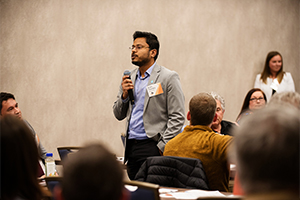
NREL also administers the Wells Fargo Innovation Incubator (IN2), a $50M technology incubator funded by the Wells Fargo Foundation. As a channel partner of IN2, the institute collaborates with and has been supported by IN2 in a variety of ways. Channel partners represent a multitude of actors involved in supporting cleantech entrepreneurship, ranging from incubator and accelerator programs to universities and research institutes. DWFI is proud to be one of IN2’s channel partners and was its first channel partner with a primary focus on agriculture.
For example, in 2020, DWFI received support from IN2 to work on strengthening Midwest agtech entrepreneurship during the COVID-19 pandemic. This project was a collaboration with Invest Nebraska’s Combine incubator. Invest Nebraska is the most active venture capital investor in the State of Nebraska; the Combine incubator is its agriculturally-focused early-stage company support program. For its COVID response grant, the DWFI/Combine project team worked to understand critical Midwest agtech ecosystem needs, strengthen partnerships, help startups manage COVID-19 disruptions, and provide technical and financial support. Here is a summary report on what we accomplished with IN2’s support.
Here are Chandra’s key takeaways from his conversations with the stakeholders and panel discussions at the 2022 Industry Growth Forum and IN2 Channel Partners meeting:
- Cleantech solutions seek to address human impacts on the environment and the mitigation of greenhouse gas (GHG) emissions, a major driver of climate change. At the same time, agtech includes applications relevant to agriculture and quality food production. The agtech and cleantech roads generally run on parallel tracks, but there are also convergence points. Some examples are the rapidly evolving agricultural carbon credit market, solar energy utilization in irrigation, and using renewable energy sources to create agricultural inputs such as fertilizers.
- Major investments are happening in the climate tech space, especially around decarbonization, carbon sequestration, and mitigation of the effects of greenhouse gas (GHG) emissions. Current expert opinion is that these investments aren’t a bubble but reflect a longer-term market trend. Attention will be on the validation of claims that the startups are making in terms of achieving environmental, social, and governance (ESG) goals. For example, while carbon markets in agriculture have the potential to address many challenges of climate change, their development is hindered both technically and financially by the difficulties and expense of measurement, reporting, and verification of changes in soil carbon content. Much of the value currently ascribed to startups hinges on their being able to demonstrate that their carbon reporting and validation innovations are correct and scalable.
- There is a growing and large focus on agtech and climate tech in emerging markets (specially, South Asia and Sub-Saharan Africa), with several US companies and startups showing their active presence in these regions. US-based startups such as New Sun Road and SweetSense have a multi-year experience in the emerging markets and some of the features they emphasize are on focusing on local jobs, partnerships and building an intentionally inclusive and diverse team (cultural, gender, or experiential) to provide perspective and growth potential.
Ankit Chandra manages the DWFI's entrepreneurship program and works on research related to water, energy, and food in irrigated agriculture, nationally and globally.


